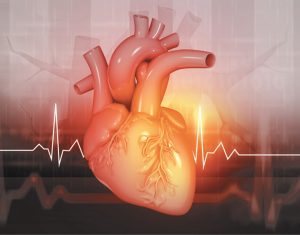By Dr. Aneley Yegezu Hundae, M.D., FACC
 The human heart, a remarkable organ that orchestrates the symphony of life, sometimes encounters irregularities that disrupt its harmonious beat. Heart arrhythmias and palpitations are common occurrences that can cause concern and warrant a closer examination of our cardiovascular health.
The human heart, a remarkable organ that orchestrates the symphony of life, sometimes encounters irregularities that disrupt its harmonious beat. Heart arrhythmias and palpitations are common occurrences that can cause concern and warrant a closer examination of our cardiovascular health.
Understanding Heart Arrhythmias
Heart arrhythmias refer to abnormal heart rhythms, where the heart may beat too quickly, too slowly, or irregularly. These disruptions can be caused by various factors, including age, heart disease, high blood pressure, diabetes, smoking, excessive alcohol consumption, and certain medications.
There are several types of arrhythmias, each with its unique characteristics. Atrial fibrillation, for example, is a prevalent form where the upper chambers of the heart (atria) quiver instead of contracting effectively. Ventricular fibrillation, on the other hand, affects the lower chambers (ventricles) and leads to sudden death unless defibrillation/shock is delivered to the heart right away.
The symptoms of arrhythmias can range from subtle to severe, including palpitations, dizziness, fainting, chest discomfort, and fatigue. Detecting and diagnosing arrhythmias often involves electrocardiograms (ECGs), Holter monitors, and other cardiac tests. Treatment options vary depending on the type and severity of the arrhythmia and may include medications, lifestyle changes, or medical procedures like ablation.
Palpitations: The Fluttering Heartbeat
Palpitations, commonly described as a fluttering, rapid, or irregular heartbeat, are sensations that may make individuals acutely aware of their heart’s rhythm. While palpitations can be a benign response to stress, anxiety, or physical exertion, they can also be indicative of an underlying heart condition.
Causes of palpitations extend beyond heart-related issues and can include caffeine consumption, dehydration, anemia, hormonal changes, or even certain medications. Stress and anxiety can exacerbate palpitations, creating a feedback loop that amplifies the perception of an irregular heartbeat.
Understanding the triggers for palpitations is crucial for both prevention and management. Adopting stress-reducing techniques, maintaining a balanced diet, and staying hydrated can contribute to a healthier cardiovascular system.
The Intersection of Arrhythmias and Palpitations
Heart arrhythmias and palpitations often intersect, as one may be a symptom of the other. For instance, palpitations can be an indication of an underlying arrhythmia, prompting further investigation. Conversely, experiencing palpitations may trigger anxiety, leading to stress-related arrhythmias.
This intricate relationship highlights the importance of seeking medical attention when palpitations are persistent, severe, or accompanied by other concerning symptoms. A comprehensive evaluation can help identify the root cause and guide appropriate treatment strategies.
Living with Heart Arrhythmias and Palpitations
For individuals diagnosed with chronic arrhythmias, navigating daily life involves a combination of medical management and lifestyle adjustments. Adhering to prescribed medications, adopting heart-healthy habits, and attending regular check-ups are vital components of maintaining a balanced rhythm.
In some cases, living with arrhythmias requires a heightened awareness of triggers and early recognition of symptoms. This self-awareness empowers individuals to make informed decisions about their health and seek prompt medical attention when necessary.
Heart arrhythmias and palpitations are common phenomena that underscore the intricacies of cardiovascular health. Understanding the nuances of these irregularities, their causes, and potential intersections is essential for both prevention and management.
In the symphony of life, our hearts play a central role, and when the rhythm falters, it’s a call to action. Regular cardiovascular check-ups, a healthy lifestyle, and an awareness of potential triggers can contribute to a harmonious heartbeat, ensuring that our hearts continue to play the music of life for years to come.
Dr. Aneley Yegezu Hundae, M.D., FACC
invasive cardiology and advanced heart failure management
Dr. Hundae received his Premedical and Doctor of Medicine Degree from Jimma University School of Medicine. He completed his Internal medicine Residency at Mercer University School of Medicine. His Heart Failure/Heart Transplant fellowship at the University of Miami Cardiovascular Fellowship Program. Cardiovascular fellowship at Baylor University Medical Center.
Board certifications
• Cardiology
• Advanced Heart Failure and Transplant
• Nuclear Cardiology
• Comprehensive Echocardiography
• Internal Medicine
3161 Harbor Blvd, Suite A, Port Charlotte, FL 33952
(941) 235-8892
www.portcharlottecardiology.com









